President Michael D Higgins has officially pardoned two men convicted of murder more than 140 years ago.
President Higgins officially signed Sylvester Poff and James Barrett's pardons for the murder of Thomas Browne in Co Kerry in 1882, saying it was time to "set the record straight".
At a ceremony at Arás an Uachtaráin, attended by descendants of the two men, he said: "While we cannot undo what happened, we do have the power to acknowledge that what happened to Sylvester Poff and James Barrett was a great wrong.
"I am pleased to be able to formally grant a Presidential Pardon to each of the men today, and to at least set the record straight.
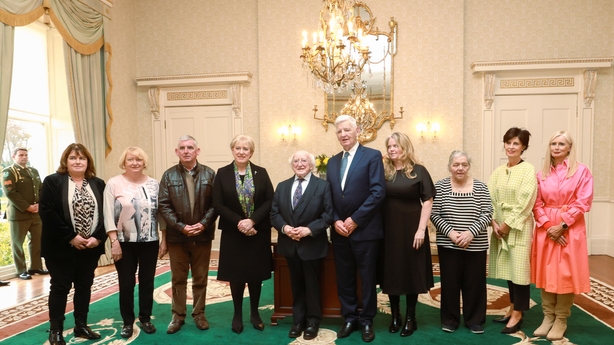
"I hope that by doing so will bring a sense of closure to their families following almost 142 years."
Sylvester Poff, 35, and his cousin, 21-year-old James Barrett, were hanged at Tralee Gaol in January 1883 having been found guilty of the murder of Thomas Browne on his farm in Dromulton three months prior.
However, last April, the Department of Justice recommended that Poff and Barrett receive a posthumous presidential pardon after an expert review of the case found those convictions to be unsafe.
Poff's great-grandsons, 89-year-old Tomo Burke and his cousin Mike Sugrue, aged in his 70s, have long been seeking justice for their ancestor.
Mr Sugrue described the torment of having an ancestor convicted of murder.
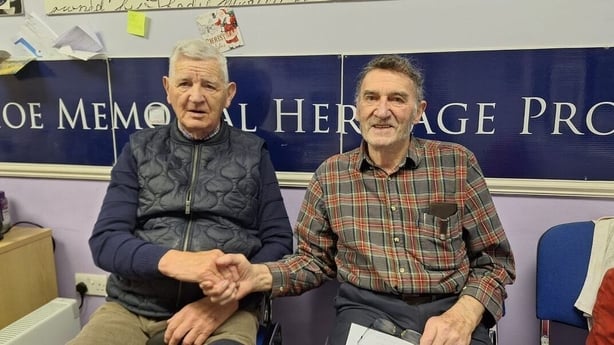
"It means a pile to me because no matter how much we believed they were innocent, the fact they were found guilty and they were hanged for it.
"There wasn't a doubt in our minds but in other people's minds, now they're completely exonerated.
"The trial was a complete joke. There wasn't a shred of evidence against them," Mr Sugrue said.
On 3 October 1882, Thomas Browne was murdered while he was working in one of his fields in Dromulton, near Scartaglin.
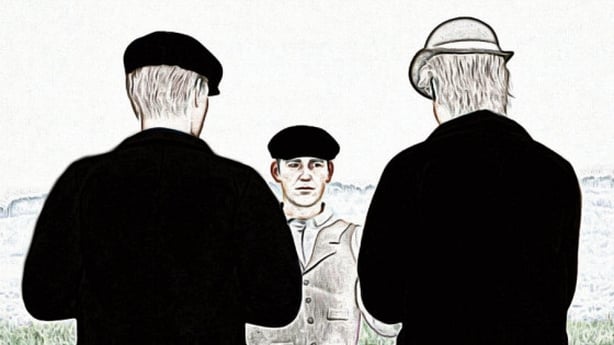
Two men dressed in dark coats were seen by a neighbour entering the field before Browne was shot several times.
Poff and Barrett did not match the descriptions of the assailants. However, they were known to be in the vicinity at the time of the murder and were arrested following a statement by the neighbour.
UCD legal expert Dr Niamh Howlin was asked to carry out a review of the case by the Department of Justice and she said she came to find the convictions unsafe as they were inconsistent with the standards of the 1880s.
She agreed that a modern-day court would not convict based on the evidence presented in 1882.
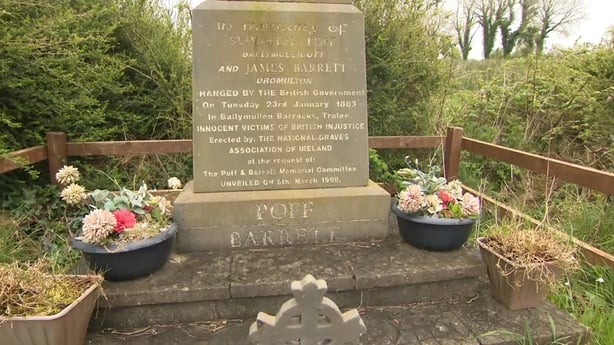
She said: "What struck me was there was no direct evidence against Sylvester Poff or James Barrett.
"The whole case centred on what we call circumstantial evidence.
"The main circumstantial evidence came from a woman who changed her story several times throughout the proceedings, so she would be an unreliable witness.
"There were eyewitnesses to the murder, and these were two young schoolboys who saw the murderers from behind.
"Neither Sylvester Poff nor James Barrett matched the descriptions that were given by those two boys.
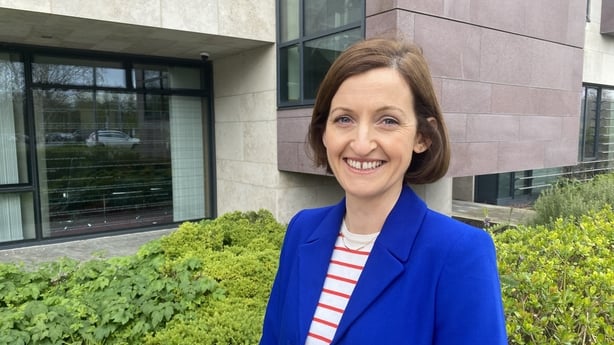
"It became very clear, very quickly, that the evidence on which the case was built wasn’t very strong," Dr Howlin added.
Poff and Barrett were tried twice before special juries in Co Cork over the murder, after the jury in the first trial failed to reach a verdict.
They were convicted of murder following a second trial and despite pleas for mercy to the lord lieutenant, they were executed.
Mr Burke described how his grandmother Ellen Poff dealt with her father’s execution.
"She felt, at least I felt, that she had a monkey on her back - the fact that her father was hanged and she felt kind of unsure of where she was going.
"She never encouraged our family, and there was 12 of the family there, to get involved - her attitude always was: 'Let the dead rest'."
However, research into the case began when a local historian from Castleisland, Co Kerry, Michael O’Donoghue, discovered the story of Poff and Barrett while in Tralee Library.
Mr O'Donoghue died in 2008 and his papers were placed in storage until 2014, when Johnny Roche and Janet Murphy of the Castleisland District Heritage Group took on his work, developed the research and realised a pardon was a real possibility.
Mr Roche said: "I know the phrase 'let the dead rest' played a bit on the decision because here we were raking up everything from the start again but I’m delighted now we did it.
"It was a tough struggle and a bit of a worry, we didn’t want to fail. It would be like hanging them all over again. It was terrible times."
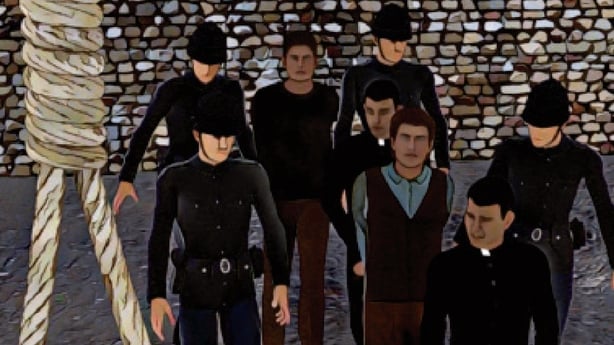
"We're very happy and relieved we've achieved this, especially with three or four generations of families, from children to 90 years of age.
"It's brilliant they can breathe freely the air, now it's been confirmed Poff and Barrett were treated abominably, hanged completely innocent without a shred of evidence against them.
"A blight has been removed from our countryside here. These men were totally innocent."
Posthumous presidential pardons are an extremely rare occurrence in the history of the State.
Since the State's foundation, this is only the fourth occasion where a historical conviction has been overturned.
Dr Howlin explained: "It's very uncommon, and part of the difficulty lies in the fact that it is quite difficult to reconstruct a trial from 100, 150 years ago.
"We don't have the eyewitnesses anymore, we often don't have the evidence that was tendered, so it is very difficult, and it is quite a high threshold that has to be met."
For Mr Burke, Mr Sugrue and generations of the Poff family, today's pardon will close the book on a lengthy quest for justice.
Mr Sugrue said: "At the end of the day, I'm quite happy with the results, it's what was due and I wouldn't have expected otherwise.
"I've one regret - that this didn't happen 50 years ago when my aunts and uncles would be overjoyed."
We need your consent to load this rte-player contentWe use rte-player to manage extra content that can set cookies on your device and collect data about your activity. Please review their details and accept them to load the content.Manage Preferences
Timeline:
3 October 1882: Thomas Browne, a farmer, is shot dead while working in one of his fields in Dromulton, near Scartaglen, Castleisland, Co Kerry
12 October 1882: Sylvester Poff and James Barrett are arrested after a statement by a neighbour, saying they had been seen enter the field where Browne was shot.
15 December 1882: The first trial of Poff and Barrett collapses after the jury fails to agree a verdict
20-22 December 1882: A second trial takes place where Poff and Barrett are found guilty by a special jury panel.
23 January 1883: Poff and Barrett are hanged at the gallows in Tralee Gaol. Dying Declarations are made public.
1960s: Daniel 'Sonny' Daly, of the family of James Barrett, makes a number of representations to President Éamon de Valera about the unjust treatment of his ancestor
8 March 1998: A celtic cross memorial to Poff and Barrett is unveiled at Dromulton by the National Graves Association.
9 July 2021: A BBC documentary series, Murder Mystery and My Family screens the story of Poff and Barrett. Two UK barristers, Sasha Wass QC and Jeremy Dein QC, revisit case and put their findings before High Court judge David Radford, who finds the convictions unsafe
16 December 2021: Castleisland District Heritage submits an application to Department of Justice for the Posthumous Pardon of Poff and Barrett.
April 2024: A report by UCD legal expert Dr Niamh Howlin on behalf of the Department of Justice finds the convictions unsafe.
16 April 2024: Minister for Justice Helen McEntee gives Government approval for Presidential pardons to be given to Poff and Barrett.
30 October 2024: President Higgins officially signs posthumous pardons for Sylvester Poff and James Barrett at Aras an Uachtarain.







